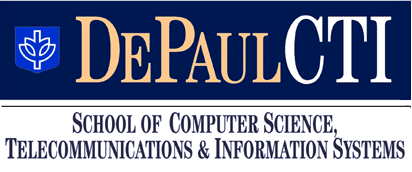
The Internet and the
Web
IT 130-401
Marcus
Schaefer
Latest additions
Assignments will be available
through this webpage. Homeworks are due on the day of class by midnight.
If you hand in the homework late 10% will be taken off the score for each day.
Homeworks will be accepted up to one week late.
Questions and Answers
- I have prepared a page with links
covering HTML, CSS, Javascript, and cookies.
-
To find out when and where you can find lab tutors with particular
background, check the
tutor
page.
-
Info about DePaul
computer labs
Schedule
Classes and office hours
The class meets TuTh 1:30-3:00 in room 1007 of the Lewis
Building.
My office hours are TuTh 3:15-4:00, and MW 2:15-3:00.
During that time you can find me in the CS&T building, room
749.
If you want to set up an appointment at another time, or
simply ask a question,
send email to mschaefer@cdm.depaul.edu.
Syllabus
For general information (literature, course summary), see the
class
syllabus.
|
Week 1-2
|
Internet, WWW, HTML
|
|
Week 3-4
|
More HTML, Design, CSS
|
|
Week 5-8
|
JavaScript and Dynamic HTML, Basic Programming Concepts
|
|
Week 9-10
|
Advanced Programming for the Web
|
Homework: 40%, Midterm: 30%, Final: 30%.
General Policies
Academic Honesty
- The course adheres to the university guideline on Academic Integrity
Policy (http://studentaffairs.depaul.edu/handbook/code17.html):
- Cheating is any action that violates university norms or
instructor's guidelines for the preparation and submission of
assignments. This includes but is not limited to unauthorized access to
examination materials prior to the examination itself; use or possession
of unauthorized materials during the examination or quiz; having someone
take an examination in one's place; copying from another student;
unauthorized assistance to another student; or acceptance of such
assistance.
- Plagiarism is a major form of academic dishonesty involving the
presentation of the work of another as one's own. Plagiarism includes,
but is not limited to the following:
- The direct copying of any source, such as written and verbal
material, computer files, audio disks, video programs or musical
scores, whether published or unpublished, in whole or part, without
proper acknowledgment that it is someone else's.
- Copying of any source in whole or part with only minor changes in
wording or syntax, even with acknowledgment.
- Submitting as one's own work a report, examination paper, computer
file, lab report or other assignment that has been prepared by
someone else. This includes research papers purchased from any other
person or agency.
- The paraphrasing of another's work or ideas without proper
acknowledgment.
- A charge of cheating and/or plagiarism is always a serious matter.
If proven, it can result in an automatic F in the course and possible
expulsion.
- The use of others' web/publication content (text, graphics, codes) is
regarded as plagiarism without giving credit (see the above description of
plagiarism).
- When you directly quote someone's work, you must put it in quotation
marks. Without such quotations and reference, it is regarded as an act of
plagiarism (see the above description of plagiarism).
- Using materials that the student prepared for other purposes (e.g.,
another course or for his/her work) needs the course instructor's prior
permission.
Incomplete
An incomplete grade is given only for an exceptional reason such as a death in
the family, a serious illness, etc. Any such reason must be documented. Any
incomplete request must be made at least two weeks before the final, and
approved by the Dean of the School of Computer Science, Telecommunications and
Information Systems. Any consequences resulting from a poor grade for the
course will not be considered as valid reasons for such a request.
Marcus Schaefer
Last updated: September 2nd, 2004.

